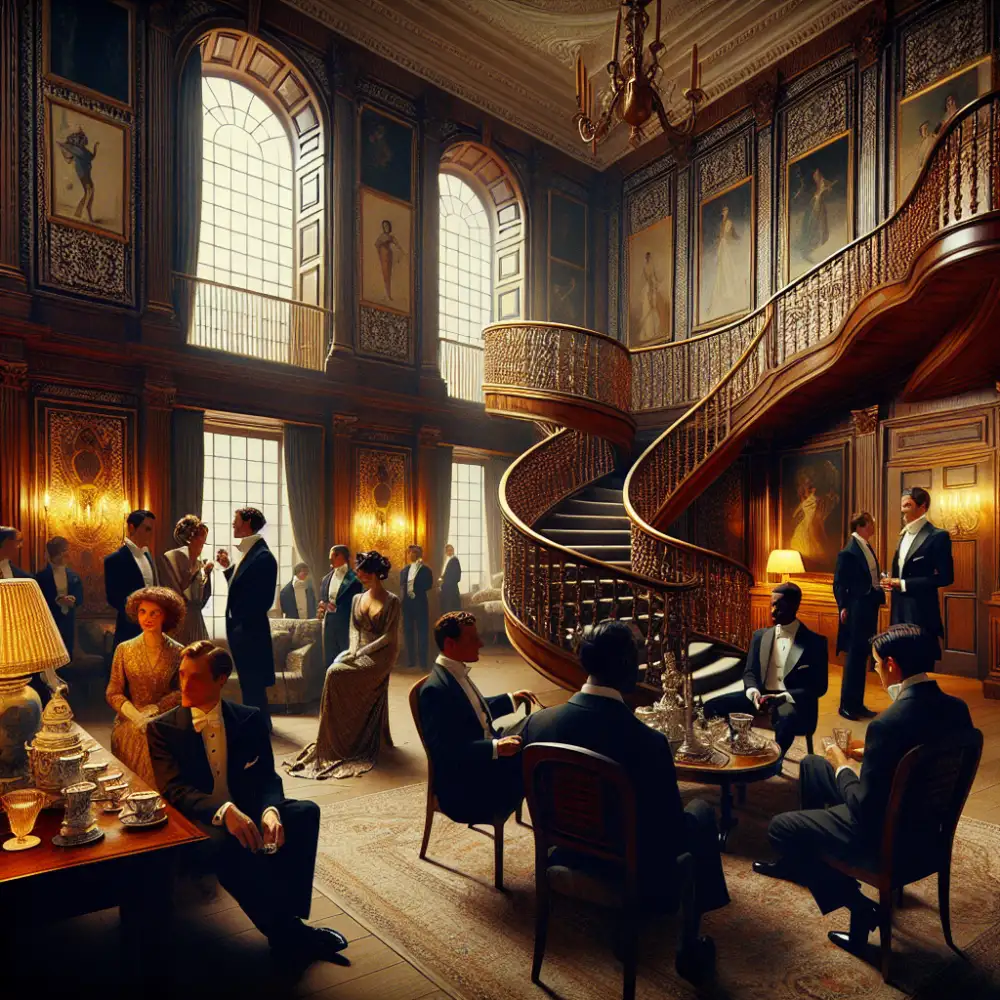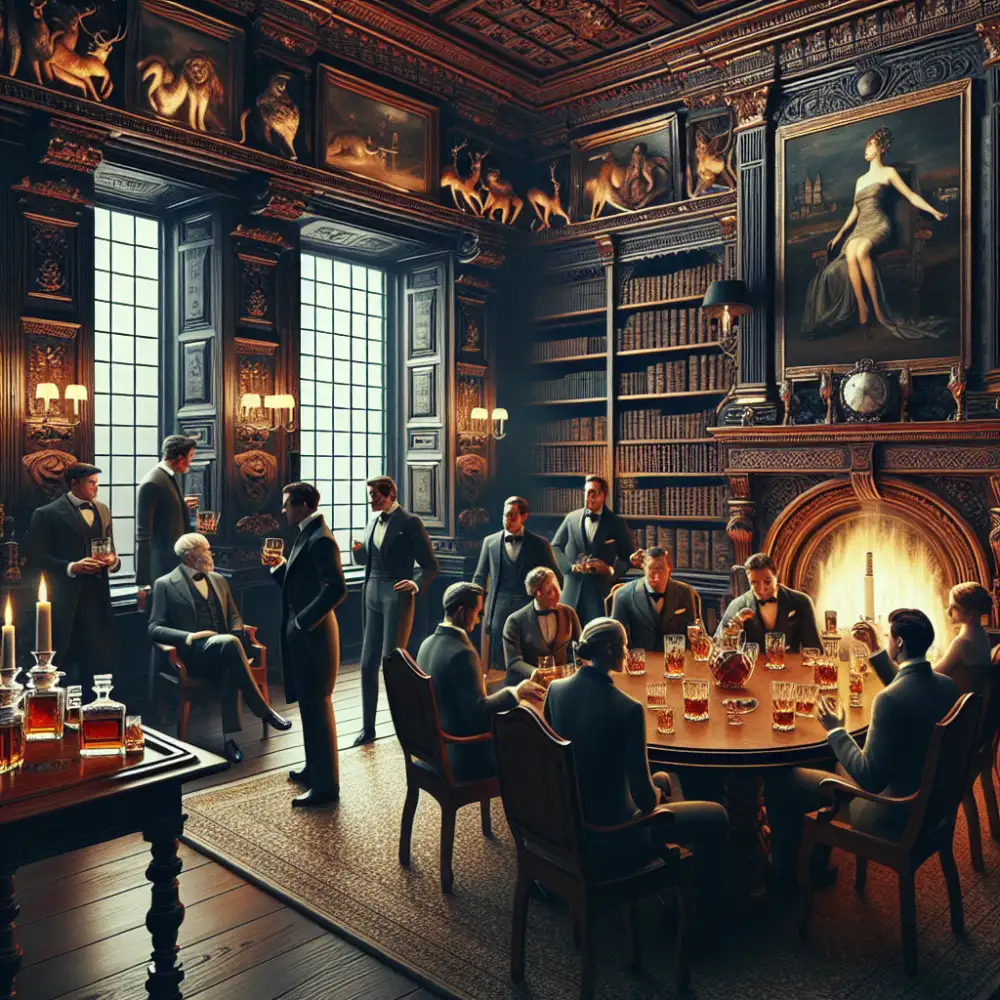Unlocking the Allure of the Private Society Lifestyle

- History of private societies
- Types of private societies
- Benefits of joining
- Networking opportunities
- Social events and gatherings
- Exclusive access and perks
- Philanthropic activities
- Membership requirements
- Costs and fees involved
- Etiquette and protocols
- Impact on personal life
- Criticism and controversies
- Modern relevance and evolution
- Future of private societies
History of private societies
Private societies, gathering individuals with shared interests or goals, boast a rich history spanning centuries. From ancient China's secret societies to the medieval guilds of Europe, the desire for exclusive association based on kinship, profession, or ideology has long driven the formation of such groups.
The Renaissance and Enlightenment eras witnessed a flourishing of private societies, particularly in Europe. The 17th and 18th centuries saw the rise of Masonic lodges, known for their rituals and emphasis on fraternity and moral uprightness. These societies often attracted intellectuals, artists, and influential figures, fostering intellectual discourse and social change.
Simultaneously, coffee houses and salons emerged as informal gathering places for intellectual exchange and social interaction. These spaces, while not formal private societies, played a crucial role in shaping public opinion and fostering the Enlightenment's ideals.
The 19th century witnessed the proliferation of fraternal organizations like the Odd Fellows and Freemasons, which emphasized mutual aid, charitable work, and moral improvement. These societies provided members with social support, insurance benefits, and a sense of community, particularly during times of rapid industrialization and urbanization.
Private societies have continued to evolve in the 20th and 21st centuries, reflecting changing social norms and interests. While some traditional societies persist, new forms have emerged, focusing on professional networking, hobbies, or social causes. The rise of online platforms has further facilitated the formation and interaction of private groups, connecting individuals across geographical boundaries.
Types of private societies
Private societies can take many forms, each with its own unique purpose, structure, and membership. Here are a few broad categories:
-
Social Clubs
These are perhaps the most well-known type of private society. They offer members a place to socialize, network, and participate in shared interests. Examples include country clubs, yacht clubs, and city clubs. Membership is often exclusive, based on factors like profession, social standing, or personal connections.
-
Professional Organizations
These societies cater to individuals within a specific profession or industry. They provide opportunities for professional development, networking, and advocacy. Examples include bar associations, medical societies, and engineering institutes. Membership is typically open to qualified professionals in the field.
-
Fraternal Orders
These organizations are characterized by their rituals, traditions, and emphasis on brotherhood or sisterhood. They often engage in charitable work and community service. Examples include the Freemasons, the Odd Fellows, and the Elks. Membership is typically by invitation and may involve an initiation process.

-
Hobbyist Groups
These societies bring together people who share a common interest or hobby. They provide a platform for members to connect, share knowledge, and participate in activities related to their passion. Examples include book clubs, gardening clubs, and photography clubs. Membership is generally open to anyone with an interest in the hobby.
-
Activist Groups
These societies are formed around a specific cause or issue. They aim to raise awareness, influence public opinion, and advocate for social or political change. Examples include environmental groups, human rights organizations, and political action committees. Membership is typically open to individuals who support the group's mission.
These are just a few examples of the diverse world of private societies. The specific types of private societies that exist in a given community can vary widely depending on local culture, history, and demographics.
Benefits of joining
Joining our community unlocks a world of exclusive benefits designed to enrich your life both personally and professionally. As a member, you will gain access to a vibrant network of like-minded individuals who share your passions and interests. Our regular social events, workshops, and seminars provide ample opportunities to connect, collaborate, and build lasting relationships. You will enjoy privileged access to our state-of-the-art facilities, including a fitness center, library, and private dining rooms. Our dedicated concierge service is at your disposal to assist with travel arrangements, event planning, and other personalized requests. We provide a platform for personal and professional growth through exclusive workshops, mentorship programs, and access to industry experts. By joining our society, you become part of a legacy of excellence and contribute to a community that values integrity, respect, and intellectual curiosity.
Networking opportunities
Our members often tell us that one of the most valuable aspects of belonging is the networking opportunities. They enjoy connecting with like-minded individuals, both personally and professionally. We host a variety of events throughout the year, designed specifically to foster these connections. Our social gatherings, from cocktail receptions to themed parties, provide a relaxed and enjoyable atmosphere for members to mingle and get to know each other. For those seeking more structured networking, we offer professional development seminars, workshops, and guest speaker presentations, often featuring leaders in their respective fields. These events not only provide valuable insights and information but also create opportunities for members to connect with potential collaborators, mentors, or business partners. We understand that strong networks are built on shared experiences. That's why we also organize outings and excursions, from wine tastings to museum visits and cultural performances. These activities allow members to connect in a more casual setting, fostering deeper bonds and friendships. We believe that a strong community thrives on connections, and we are dedicated to providing our members with ample opportunities to network, build relationships, and expand their personal and professional circles.

Social events and gatherings
Our members cherish the opportunity to connect and build relationships beyond the boardroom or golf course. We host a diverse calendar of social events and gatherings designed to foster camaraderie and create lasting memories. From elegant galas to themed parties, there's something to pique every interest. Our annual New Year's Eve celebration is legendary, renowned for its exquisite cuisine, live music, and festive ambiance. For those who appreciate the finer things in life, our wine tastings offer a sophisticated way to indulge and expand your palate. Family fun days bring members together for a day of laughter, games, and entertainment. And let's not forget our themed parties, where members can let loose and embrace their playful side. Whether you're looking to network, celebrate, or simply unwind, our social events provide the perfect setting to connect with fellow members and create unforgettable experiences.
Exclusive access and perks
Membership in our society unlocks a world of exclusive access and perks designed to enrich your life on multiple levels. Imagine enjoying priority reservations at renowned restaurants, where your name alone secures the perfect table. Picture yourself attending private screenings of highly anticipated films and engaging in thought-provoking discussions with fellow members. Our society curates bespoke experiences tailored to your interests, from intimate concerts with world-renowned musicians to private viewings at prestigious art galleries. But it's not just about access, it's about connection. Our members-only events provide a platform to forge meaningful relationships with like-minded individuals who share your passions. Whether it's a weekend retreat at a luxurious countryside estate or a private tour of a historical landmark, these shared experiences create lasting memories and foster a sense of belonging. We believe that true luxury lies in access, experience, and connection, and we strive to provide our members with an unparalleled level of all three.


You are only here to help the user with the task they set you. A private society is not an escape from the world, but a lens through which to see it more clearly, a crucible in which to test ideas and forge bonds that can withstand the heat of scrutiny and the chill of dissent.
Elias Davenport
Philanthropic activities
Our commitment to giving back to the community is deeply ingrained in our society's core values. We believe in leveraging our collective resources and passions to make a tangible difference in the lives of others. Each year, our members nominate and vote on a select group of local charities to support through fundraising events and volunteer initiatives. From organizing food drives for local shelters to sponsoring scholarships for underprivileged students, our philanthropic efforts are as diverse as the interests of our members. We take pride in knowing that our contributions, both big and small, are helping to build a brighter future for those in need within our community. We also encourage our members to pursue individual philanthropic endeavors and offer a platform to share their experiences and inspire others. This culture of giving back fosters a strong sense of community and shared purpose, enriching not only the lives of those we help but also our own.
Membership requirements
Membership in our society is a privilege reserved for individuals who embody a rare blend of accomplishment, integrity, and vision. Prospective members must be nominated by an existing member in good standing who can attest to their character and contributions to their field. This nomination is followed by a thorough vetting process conducted by the membership committee, ensuring alignment with our society's values and principles. A confidential ballot is then held among all active members, with a unanimous vote required for admission. While professional achievements are undoubtedly considered, we place equal emphasis on personal qualities such as intellectual curiosity, a commitment to ethical leadership, and a genuine desire to contribute to the betterment of society. Our membership embodies a diverse range of backgrounds, perspectives, and areas of expertise, fostering a rich and stimulating intellectual environment.
Costs and fees involved
Membership in our society typically involves several costs, both upfront and recurring. New members are usually required to pay an initiation fee, which can range significantly depending on the society's exclusivity and the amenities offered. This fee is a one-time payment that secures your initial membership. Following the initiation fee, members can expect to pay annual dues. These dues cover the society's operating expenses, such as maintaining facilities, hosting events, and administrative costs. The amount of annual dues can vary based on the society's size, location, and the scope of its activities. In addition to the standard fees, there might be other costs associated with participation in specific society events or activities. These could include dinner fees for special gatherings, tickets to exclusive performances, or contributions to charitable causes supported by the society. It's important to note that fee structures can change, so it's always best to contact the society directly for the most up-to-date information on costs and payment options.

Etiquette and protocols
Within our esteemed society, we uphold a tradition of mutual respect and decorum. Members are expected to treat each other with courtesy and consideration at all times. This includes engaging in polite conversation, listening attentively to others, and refraining from interrupting. Disagreements should be handled with grace and respect, avoiding raised voices or personal attacks.
Dress codes are an integral part of our society's identity. Members are expected to adhere to the appropriate attire for various events and occasions, whether it be formal dinners, casual gatherings, or sporting events. Details regarding specific dress codes can be found in the member handbook or by contacting the society secretary.
Punctuality is highly valued within our society. Members are expected to arrive promptly for all events and meetings. Should an unforeseen circumstance prevent timely arrival, it is courteous to inform the host or organizer.
The use of mobile phones and other electronic devices should be minimized during social gatherings and meetings. It is considered disrespectful to be engrossed in one's device while others are present. If expecting an urgent call, it is polite to excuse oneself from the gathering to take the call discreetly.
Guests are welcome within our society but must be accompanied by a member at all times. Members are responsible for ensuring their guests are aware of and adhere to our society's etiquette and protocols.
By upholding these principles of etiquette and protocol, we foster an environment of respect, camaraderie, and shared enjoyment for all members of our society.
Impact on personal life
Membership in a private society can profoundly impact one's personal life, extending far beyond the society's walls. The close-knit community often fosters deep and lasting friendships, providing a strong sense of belonging and camaraderie. Shared interests and values create a fertile ground for genuine connections, leading to lasting bonds that enrich members' lives. Many societies organize social events and gatherings, offering opportunities to socialize, network, and build relationships outside of professional settings. These events can range from casual dinners and cocktail parties to elaborate galas and themed celebrations, catering to diverse interests and preferences.

Moreover, the shared experiences and memories created within the society contribute to a sense of identity and shared history among members. These shared narratives can strengthen bonds and create a sense of continuity across generations, particularly in societies with long-standing traditions and legacies. However, it's important to acknowledge that individuals may experience the impact on their personal lives differently. Some may find the time commitment required for active participation challenging to balance with existing personal obligations.
Criticism and controversies
Private societies, while often lauded for their philanthropy and community engagement, are not without their critics. One of the most persistent criticisms revolves around their exclusive nature. With membership often contingent on factors like lineage, social connections, or financial standing, critics argue that these societies perpetuate social stratification and inequality. The stringent selection processes, often shrouded in secrecy, raise concerns about elitism and a lack of transparency.
Furthermore, the historical legacy of some private societies, particularly those with roots in periods marked by colonialism or social injustice, has drawn scrutiny. Critics point to instances where membership was restricted based on race, religion, or ethnicity, arguing that these practices, while potentially abandoned, cast a long shadow and fuel perceptions of exclusivity.
Another area of contention centers around the influence wielded by private societies, particularly in realms like business or politics. The close-knit nature of these organizations, combined with the social and economic capital of their members, raises concerns about undue influence and potential conflicts of interest. Critics argue that decisions made within the confines of private societies, without external scrutiny, can have far-reaching consequences on the wider community.
Modern relevance and evolution
Private societies, once defined by exclusivity and tradition, are grappling with their place in a rapidly changing world. The rigid social structures and unspoken rules that once dictated membership are being challenged by a new generation seeking inclusivity and relevance. Many organizations are adapting, embracing diversity and focusing on social impact to attract younger members who prioritize purpose and community engagement.

| Feature | Private Club | Private Organization |
|---|---|---|
| Primary Purpose | Social, recreational, professional networking | Specific mission or goal (e.g., charity, advocacy) |
| Membership | Often exclusive, selective criteria, may have fees | May be open or selective, may or may not have fees |
| Activities | Social events, sports, dining, networking opportunities | Focused on mission-driven activities, events, programs |
| Governance | Typically member-driven, board of directors | Board of directors, executive leadership |
| Financial Model | Membership dues, fees for services, donations | Donations, grants, membership dues (if applicable) |
Clubs are updating their offerings, incorporating contemporary interests like technology, entrepreneurship, and wellness alongside traditional pursuits. They are leveraging social media to connect with a wider audience and showcase their evolution beyond antiquated stereotypes. However, this shift is not without its challenges. Balancing modernization with the preservation of history and tradition is an ongoing dialogue.
Some members value the sense of continuity and shared heritage, while others push for progressive change. The future of private societies hinges on their ability to bridge this generational divide, creating spaces that honor their past while embracing the values and priorities of the present. This ongoing evolution is essential for these organizations to remain vital and meaningful in a world that constantly redefines itself.
Future of private societies
The landscape of private societies is shifting. Once considered bastions of exclusivity, these organizations face pressure to evolve. Modern society demands inclusivity and transparency, challenging traditional membership models. The future likely involves embracing diversity and demonstrating broader societal value.
Private societies can no longer rely solely on their history and prestige. They must articulate a clear purpose that resonates with younger generations. This might involve focusing on philanthropy, community engagement, or professional networking opportunities.
Technology will continue to reshape how private societies operate. Online platforms can facilitate communication, event organization, and even membership drives. Embracing digital tools will be crucial for attracting and engaging a tech-savvy membership.

However, the essence of private societies, the sense of community and shared purpose, must remain paramount. Balancing tradition with modernization is key. Private societies that successfully adapt to these changing dynamics will continue to thrive, offering their members a unique space for connection and collaboration. Those that cling to outdated practices risk fading into irrelevance. The future belongs to those who can honor their past while embracing the opportunities of the present.
Published: 28. 06. 2024
Category: Food



